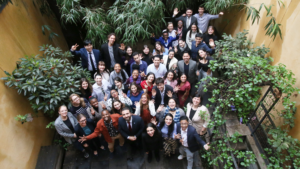
The commission on the status of women is probably one of the most interesting commissions at the UN and also one of the largest. This is the commission’s 53rd year focusing on the equal sharing of responsibilities between men and women, including care giving in the context of HIV/AIDS. I have had the privilege of attending this commission to represent WYA. Since the beginning I have attended several events organized by African representatives.
One of them was a side event organized by the Mothers’ Union, a Christian organization. After sitting through the meeting, something that I noted was the way the audience oohed and aahed at the progress made in achieving gender equality. I was wondering if it was because the majority of the audience was made up of women and especially mothers. One of the panelists stood up to talk about the aim of the organization which was; to improve women’s lives, create awareness, provide training, involve men in care giving programs, empower women financially and fight for human women’s rights. This last point is a bit confusing, or is it just me?
I also attended an event about Bridging the Gap in a male dominated society- African perspective. It was organized by Worldwide Organization for Women. I thought I was educated on the African culture but after this event, I couldn’t be so sure.
A panel member was given the floor and she started her speech by thanking the “chairman,” Mrs. Carol. Her words were followed by gasps and whispers from the audience and finally somebody shouted, “Chairperson!” Another panel member also felt that she had to bring to light the point that she was at the commission and her husband was in the kitchen, cooking. There was a round of laughter and applause. I was left wondering if I had missed the joke about how it’s funny for a husband to be home cooking.
I met an amazing young lady from Kajiado, Kenya who was going to give a speech on “Empowering the Girl Child”. She has been doing tremendous work with several NGO’s, speaking against harmful cultural practices that affect mostly girls.
So far, it has been a good week. It was interesting to hear what the African representatives had to say because, first I’m African and second I’m a woman. I feel however that, issues affecting young girls were not sufficiently dealt with and when they were, it was in isolation, as if young people were independent agents instead of members of a family or community. It made me think that the UN has a lot to learn from Africa about solidarity and how irreplaceable it is if we are to promote the well being of young women or anyone else.







